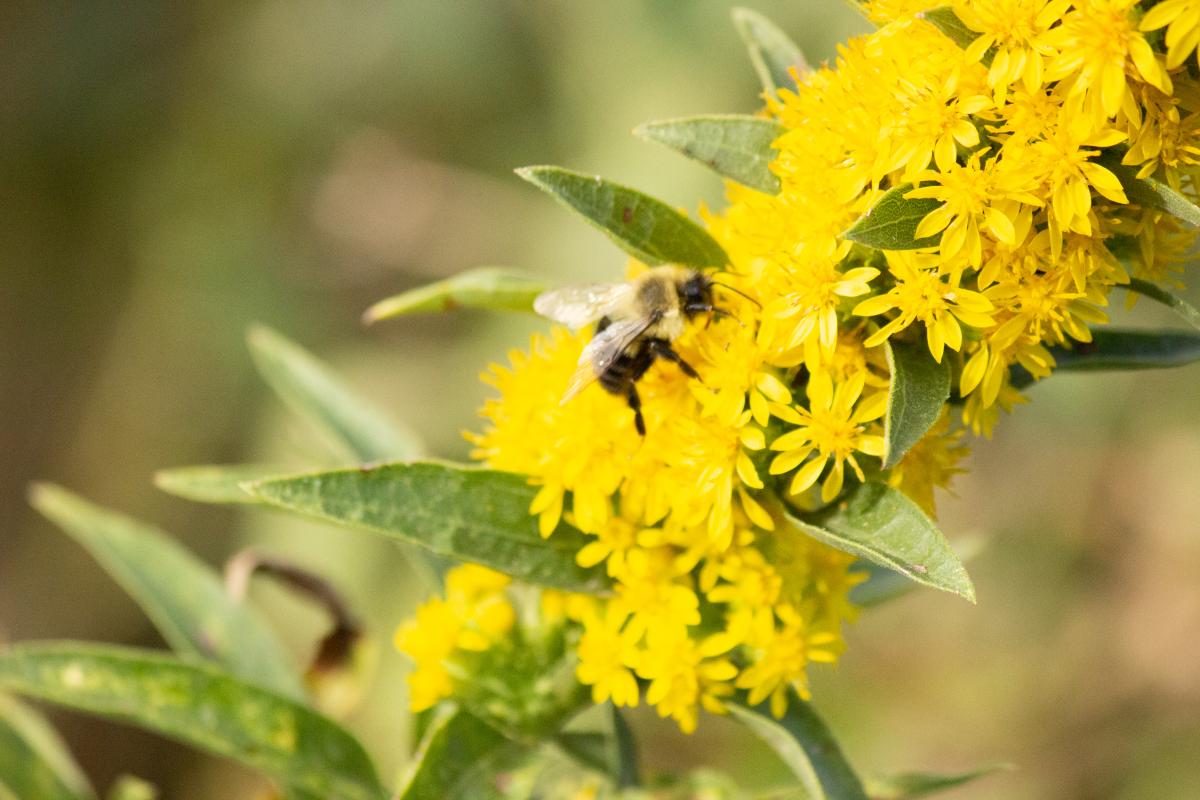
Good Bugs Reduce Pesticide Use in Nebraska
A Healthy Field Increases Yields and Creates a Home for Beneficial Insects
Many farmers battle with insects that are pests, but some insects are beneficial and needed to keep pests controlled. Farming practices play an important role in creating a home for these good bugs and many practices can even help conserve good bugs, reduce pests, and result in higher crop yields.
Matheus Ribeiro, post-doctoral research associate in the Department of Entomology at the University of Nebraska–Lincoln, studies the best ways to manage pests, but also pays close attention to preserving beneficial insects.
Field crop entomology is the interaction of the insects in and around the fields – including both beneficial bugs and pests, Ribeiro said.
Julie Peterson, associate professor also in the Department of Entomology at the university, studies additional ways to convert annual crop production into perennial grasses to support beneficial insects, such as bees, butterflies, dung beetles and lady beetles – insects that actually provide services to plants and animals in the area.
“Having perennial grasses, like wildflowers and other diversity of mixed plants, can help support the beneficial insects,” Peterson said. “For example, grasses next to a crop field provide a habitat for good insects where they are supported and even increased, which ultimately benefits the crops.”
These beneficial insects can actually help increase crop yields and reduce the need for pesticides.
“Integrated pest management focuses on the importance of maintaining the crops, insects, and wildlife with all the beneficial insects and pest eating bugs,” Ribeiro said. “Good bugs will make a big difference in reducing the number of pesticides that might need to be used to control and manage pests.”
Impacts of Beneficial Insects
Beneficial insects provide a wide variety of services for the ecosystem, such as food for other wildlife, pollination, and decomposition, Peterson said .
Good bugs also provide a natural, biological control for field crops. Lady beetles are a great example of this biological control.
“If producers can create a habitat for the lady beetles, the good bugs will start moving into the corn field,” Peterson said. “For example, lady beetles eat pests, such as the eggs of the western bean cutworm, which results in the reduced need for large amounts of chemicals.”
Decomposition is another service beneficial bugs can give back to the ecosystem. For instance, Peterson said the dung beetle is a great example of a beneficial insect.
“Dung beetles help get the decomposition cycle going in the fields,” Peterson said. “Specifically, dung beetles help break down the dung and get the nutrients back in the soil, and that is good for the soil.”
Dung beetles act quickly before pests can lay eggs, which also helps to control the number of pests.
Understanding the biology of a pest is key to being able to manage pests and learn for the future, Ribeiro said.
Preservation of Good Bugs
Preserving beneficial insects is crucial because the interaction of a field insects plays a large role in the health of the crops.
“The goal is not just finding for a silver bullet to solve all the issues related to pest management,” Peterson said. “The goal is to find solutions that can work together to control the pests.”
Entomologists are realizing the need for more biological control and integrated pest management practices, such as creating grass areas next to fields, adding more flowers for pollinators, and using precision technology to apply chemicals more specifically.
“Pesticides have become more selective and do not harm anything other than the specific pest it is mean to target, which is a big change from the past,” Ribeiro said.
Integrated Field Crop Management is the Future
Integrated field crop management is the future of maintaining habitats for beneficial insects and increasing Nebraska crop yields. Peterson said data is collected from many fields in western Nebraska to help learn the behaviors of the beneficial insects.
Incorporating all the knowledge from research into a field plan is the best way for growers to find what works best for the ecosystem of their fields. Peterson’s team uses the research data they collect from local fields to help talk to growers about best practices and the importance during field days.
“Agriculture is a challenging environment, not only for researchers, but specifically for the growers,” Ribeiro said. “CropWatch is a university provided resource available to the public that regularly shares new information to growers and covers different types of growing systems and topics to help growers make informed crop management decisions.”
The public can access the CropWatch coverage at https://cropwatch.unl.edu/.
While managing the benefits in the environment can be challenging and takes time, it is a vital part of continuing to have good bugs help manage pests and increase crop yields.
For more information about field crop entomology and the research Peterson and Ribeiro are conducting, please visit https://entomology.unl.edu/agroecosystems/ or West Central Research, Extension, and Education Center at https://extension.unl.edu/statewide/westcentral/.
Key Takeaways:
- Many farmers battle with insects that are pests, but some insects are good and needed to keep pests controlled. Farming practices play an important role in creating a home for these good bugs and many practices can even help conserve good bugs, reduce pests, and result in higher crop yields.
- Beneficial insects provide important services in field crop areas, such as food for other wildlife, biological control, pollination, and decomposition.
- Beneficial insects can also help increase crop yields and reduce the need for pesticides.
- CropWatch (https://cropwatch.unl.edu/) is a great resource available to the public to gather suggestions from researchers and experts in the area of beneficial bugs.
- For more information about field crop entomology and the research Peterson and Ribeiro are conducting, please visit https://entomology.unl.edu/agroecosystems/ or West Central Research, Extension, and Education Center at https://extension.unl.edu/statewide/westcentral/.
